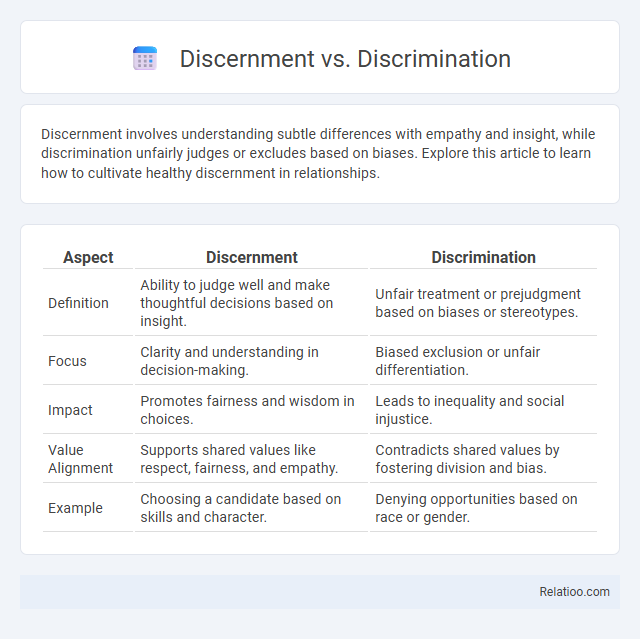Discernment involves understanding subtle differences with empathy and insight, while discrimination unfairly judges or excludes based on biases. Explore this article to learn how to cultivate healthy discernment in relationships.
Table of Comparison
| Aspect | Discernment | Discrimination |
|---|---|---|
| Definition | Ability to judge well and make thoughtful decisions based on insight. | Unfair treatment or prejudgment based on biases or stereotypes. |
| Focus | Clarity and understanding in decision-making. | Biased exclusion or unfair differentiation. |
| Impact | Promotes fairness and wisdom in choices. | Leads to inequality and social injustice. |
| Value Alignment | Supports shared values like respect, fairness, and empathy. | Contradicts shared values by fostering division and bias. |
| Example | Choosing a candidate based on skills and character. | Denying opportunities based on race or gender. |
Understanding Discernment: Definition and Importance
Understanding discernment involves recognizing its role as the ability to perceive subtle distinctions and make thoughtful judgments, grounded in insight and wisdom. Unlike discrimination, which often implies unfair bias, and differentiation, which is simply identifying differences, discernment requires deep analysis and ethical consideration. Cultivating discernment is crucial for effective decision-making, fostering empathy, and enhancing critical thinking skills in complex situations.
Defining Discrimination: A Societal Perspective
Discrimination, from a societal perspective, involves unjust or prejudicial treatment of individuals based on characteristics such as race, gender, age, or religion, leading to systemic inequality and social exclusion. Unlike discernment, which refers to the ability to judge well or perceive differences neutrally, discrimination imposes negative biases that affect opportunities and rights. Understanding this distinction is crucial for addressing social justice issues and promoting equitable policies.
Key Differences Between Discernment and Discrimination
Discernment involves the ability to perceive and understand subtle distinctions with clarity and insight, often leading to wise decision-making. Discrimination, while it can mean recognizing differences, frequently carries a negative connotation relating to unfair treatment based on those differences. The key difference lies in discernment's positive, thoughtful evaluation versus discrimination's potential bias or prejudice in the assessment of others.
Historical Contexts of Discrimination
Discrimination has deep historical roots tied to social, racial, and economic inequalities, often manifesting as systemic exclusion and oppression based on identity markers such as race, gender, or class. Unlike discernment, which involves careful judgment or perception, discrimination in historical contexts refers to unjust treatment institutionalized through laws and cultural practices. Understanding these distinctions highlights how discrimination shaped social hierarchies and power dynamics across different civilizations and eras.
The Role of Discernment in Decision Making
Discernment plays a critical role in decision making by enabling individuals to identify subtle differences and assess the relevance of information with clarity and insight. Unlike discrimination, which often carries a negative connotation related to bias, discernment emphasizes thoughtful judgment based on evidence and context. Effective discernment enhances the quality of choices by filtering out noise and focusing on meaningful distinctions that align with goals and values.
Negative Impacts of Discrimination
Discrimination involves unfair treatment based on characteristics such as race, gender, or age, leading to social inequality, decreased opportunities, and psychological harm. Unlike discernment, which is the ability to judge well, or discrimination in a neutral sense of distinguishing differences, discriminatory actions cause systemic bias and marginalization. Understanding these distinctions helps you recognize how discrimination negatively impacts individuals and communities by fostering exclusion and injustice.
Cultivating Healthy Discernment in Daily Life
Cultivating healthy discernment in daily life involves sharpening your ability to distinguish between valuable insights and misleading information, enhancing decision-making skills rooted in wisdom and experience. Unlike discrimination, which unjustly differentiates between people, and mere discernment, healthy discernment emphasizes empathy, fairness, and critical thinking. Developing this skill fosters personal growth, improves relationships, and promotes ethical choices.
How Bias Influences Discrimination
Bias significantly influences discrimination by shaping unjust attitudes and behaviors toward specific groups based on stereotypes rather than objective evaluation or discernment. Discernment involves careful judgment and understanding, while discrimination arises when bias leads to unfair treatment or exclusion. Your awareness of bias helps foster discernment, reducing the negative impact of discrimination in personal and social contexts.
Strategies to Replace Discrimination with Discernment
Replacing discrimination with discernment requires cultivating critical thinking skills and empathetic understanding to evaluate individuals or situations based on merit rather than bias. Implementing training programs that emphasize cultural competence, implicit bias recognition, and ethical decision-making fosters fair judgment and inclusive behavior. Organizations can also establish clear policies and accountability measures that promote transparency and equitable treatment in all interactions.
Building Inclusive Communities Through Discernment
Building inclusive communities through discernment involves recognizing diverse perspectives with empathy and respect while avoiding discriminatory biases that exclude or marginalize groups based on differences. Discernment emphasizes thoughtful evaluation and understanding, enabling leaders to identify genuine needs and promote equitable participation without prejudice. This approach fosters trust, collaboration, and belonging by valuing individual experiences and creating environments where all voices are heard and appreciated.

Infographic: Discernment vs Discrimination
 relatioo.com
relatioo.com